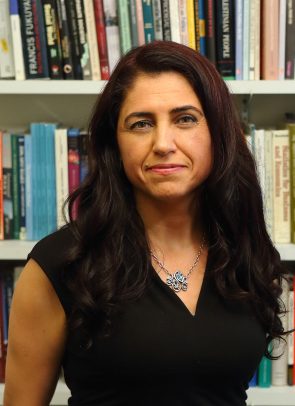Silver Circles: Sultan Tepe

Since 1966, the Silver Circle Award has been presented to some of UIC’s best teachers. Winners, who are honored at their college commencements, receive $500 and their names join a long list of distinguished colleagues. But what makes the award especially meaningful is its selection committee: the graduating seniors.
Sultan Tepe
Associate professor of political science
Silver Circles: 1
Years at UIC: More than 10
What does it mean to win this award from the graduating seniors?
Teaching at times feels like shouting in a vast field, and you never know how your voice will be echoed. I am very honored and humbled that the graduating seniors found my voice and teaching approach valuable and memorable. It is always risky to test the boundaries of customary teaching tools, but I tend to diverge from some conventional practices (I don’t assign a textbook, I don’t use exams) and to challenge students to approach issues from different perspectives. I hope to enrich the way my students think about various topics and regions using unconventional means that spark critical thinking. My teaching seeks to empower students and give them a platform to show their ability to master different materials and enhance their own assessments.
What do you teach?
I have been teaching various topics from research design, comparative politics, the politics of Middle East, to urban politics. My efforts focus on students’ self-empowerment, helping them to become confident and courageous learners, which makes my job much easier and enjoyable.
How do you engage students in your courses?
Due to our specific historical context, I believe it is the best time to be a student of liberal arts and sciences. Whatever the topic of my course, I try to help students to link what might appear dry and abstract in terms of social sciences and humanities to the issues surrounding us and undertake some form of original research. One of the most satisfying aspects of my job is to witness how students improve their analytical skills and their ability to critically engage difficult topics. I have been fortunate to have great mentors throughout my own learning process. One of my mentors, Professor Robert Luskin, would remind us of the virtue of not having a quick explanation, giving a whole different meaning to David Hume’s infamous statement, “Explanation is where the mind rests.”
What is your advice to graduating students?
Unfortunately, “critical thinking” has become a motto but it is often confused with polemical and normative thinking, a replacement of one set of one-sided statements with others. I consider my job accomplished when I give the students a taste of rigorous and often painful research with open-ended outcomes. I try to help my students to learn to ask good questions and not to privilege formulating perfunctory answers. It is acquiring the ability to ask good questions where the real learning occurs. In a post-factual and morally relativistic world, I hope my students would be excellent questioners, truth and justice seekers without having ready answers, and would move beyond the tribalistic thinking that mars societies everywhere.
